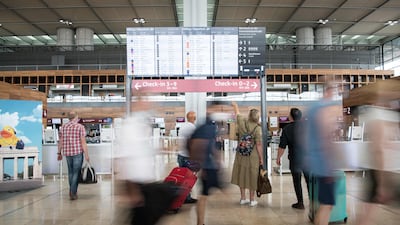The rally in oil prices, which rose towards $75 per barrel on Wednesday, indicates an economic rebound that will propel the global aviation industry's recovery from the Covid-19 pandemic, the head of the International Air Transport Association has said.
The fuel bill represents about 20 per cent of an airline's cost base this year and comprises a higher percentage for low-cost carriers, Willie Walsh, director general of Iata, said on Wednesday.
"The positive I take out of the oil price is that it generally reflects strong global economic demand, clearly prices are not driven by speculation at the moment," Mr Walsh said.
"Strong demand for oil, at the $70-$75 range, reflects a generally positive economic environment which will support the airline industry as we recover through this crisis."
The International Monetary Fund said oil prices are expected to rise close to 60 per cent this year above their low base of $41.29 a barrel in 2020, with the Washington-based lender forecasting an average based on futures markets (as of June 2, 2021) of $64.68 in 2021 and $63.02 in 2022. Brent prices were trading at $74.96 a barrel at 9.03pm UAE time.
Airlines' fuel hedging ratios are slightly lower now compared to pre-Covid levels but this will be compensated by a recovery in air travel demand and passenger revenue, Ezgui Gulbas, Iata's senior economist, said during the online conference.
Airlines will examine their hedging strategies more closely after the Covid-19 crisis led to a 90 per cent plunge in travel demand during the early stages of the pandemic.
"That was a unique environment and a new risk that airlines will need to factor in when they look at their hedging policies going forward," Mr Walsh said.
"I don't see the oil price being a factor that will create any distortion in the competition going forward," he added.
In April, Iata's then chief economist Brian Pearce had expressed concern that rising jet fuel prices could make it more challenging for airlines to turn cash-positive during the year, given the low load factors for international travel at the time.
Passenger air travel demand improved slightly in June in both international and domestic travel markets, according to Iata.
Overall demand for air travel in June, measured in revenue passenger kilometres, or RPKs, was down 60.1 per cent compared to June 2019, Iata said in its monthly report. That was a small improvement over the 62.9 per cent decline recorded in May 2021.
Demand for international travel in June was 80.9 per cent below pre-crisis levels in June 2019, an improvement from the 85.4 per cent decline recorded in May 2021. All regions except Asia-Pacific contributed to the slightly higher demand.
Demand for domestic travel was down 22.4 per cent compared to June 2019, a slight gain over the 23.7 per cent decline recorded in May 2021. The performance across key domestic markets was mixed with Russia reporting robust expansion while China's domestic market shrank, Iata said.
Middle Eastern airlines posted a 79.4 per cent drop in demand last month compared to June 2019. This was an improvement from the 81.3 per cent decrease in May. Capacity declined 65.3 per cent and load factor, a measure of how well an airline fills seats, fell 31.1 percentage points to 45.3 per cent.
Mr Walsh said the industry was already seeing a recovery starting in the second half of this year.
"There are signs of things improving and restrictions being relaxed or removed and we've got to take positives from that," he said. "We are at a point where there are reasons to be optimistic in most markets, but [it's] disappointing to see some markets continue to hold restrictive measures."
Easing travel restrictions and resuming trans-Atlantic flights are necessary for a meaningful recovery in the aviation industry, Ms Gulbas said.
While Covid-19 vaccines are progressing, travel restrictions remain strict globally compared to the beginning of 2021.
Three out of four countries have strict international travel controls, ranging from quarantine measures and bans in high-risk regions, to complete border closures, Ms Gulbas said.
Air cargo continued its strong streak in June.
Air freight demand grew 9.9 per cent in June, an improvement on pre-crisis levels, Iata said. This pushed first half-year air cargo growth to 8 per cent, its strongest first-half performance since 2017, when the industry posted 10.2 per cent year-on-year growth.
The strong performance of air cargo is expected to continue in the second half of 2021 as demand remains strong and air freight prices beat those of sea freight, Mr Walsh said.
Asked how big of a boost airlines will get following England's decision to drop quarantine restrictions on fully vaccinated travellers from the EU and the US from next week, Mr Walsh said the step "has to be seen as a positive".
"It's just addressing what most people felt was a ridiculous anomaly," he said. "Why is it that someone who received vaccination in the UK could travel abroad and return to the UK without restriction, but somebody who received their vaccination in Europe cannot travel to the UK without restriction?"
"It's a very common sense approach now," he added. "It merely addresses what should have been done."


